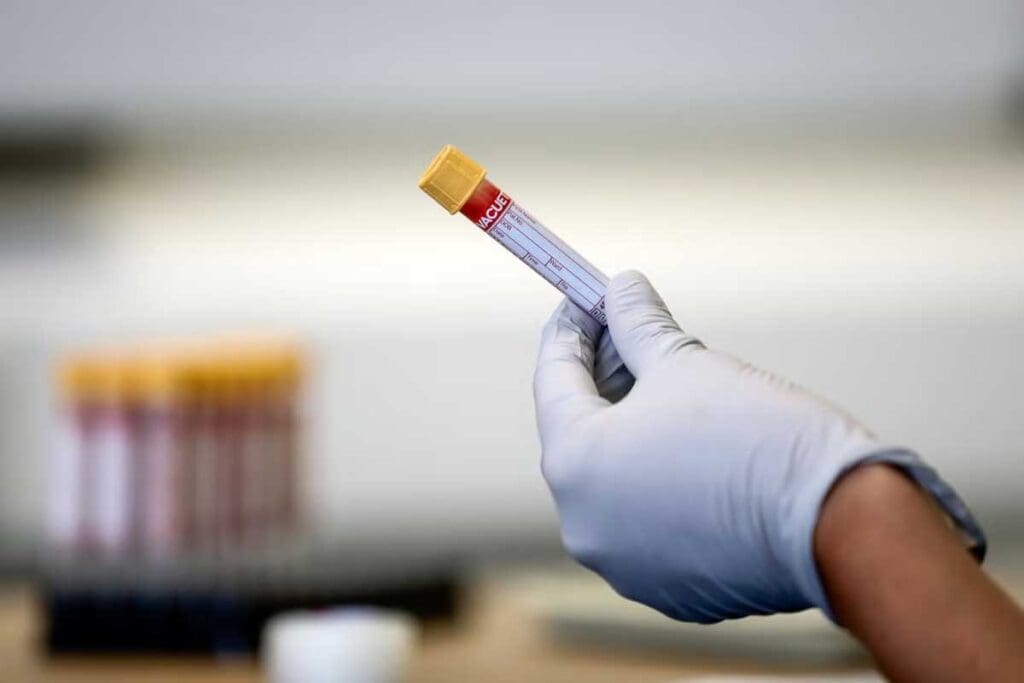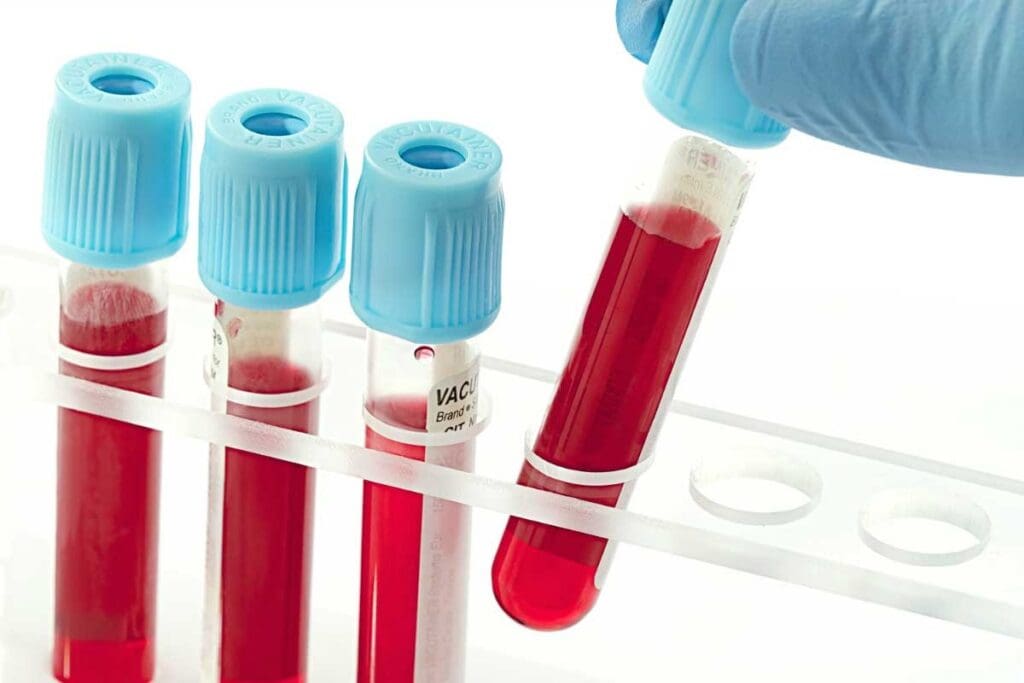Last Updated on November 17, 2025 by Ugurkan Demir

Regular blood tests are key for doctors to check your health. At Liv Hospital, we know how important these tests are. They give a full picture of your health.What can blood work show? Learn 12 crucial and powerful things blood tests can quickly and amazingly detect now.
Blood work shows a lot about your health. It checks things like red and white blood cells, platelets, and glucose. Doctors use tests like CBC, BMP, and CMP to see if you have infections, anemia, or if your organs are working properly.
We will look at the 12 main things blood tests can quickly detect. This will help you see why regular blood work is so important.

Blood tests let us peek into our health, helping find and track different health issues. Doctors use these tests to check our health and spot problems early.
Modern blood tests look at our blood’s parts, like red and white cells, and chemicals. This detailed check gives us health insights. It helps find infections, anemia, immune problems, and metabolic issues like diabetes.
A board-certified doctor says blood tests are key to health. “They show a lot about our health, from infections to organ function,” he explains.
Doctors often start with blood tests because they give a wide view of our health. By looking at our blood, doctors can spot and track health issues. This makes blood tests essential for care and treatment plans.
Blood tests find signs of organ problems, nutritional gaps, and other health issues. Knowing what blood tests can find helps us see why regular tests are vital for our health.

A single blood sample can show many health indicators. This makes blood work key for preventive care. When we get blood tests, we’re not just checking one thing. We’re getting a full view of our health.
Blood tests can find many health markers. They check cholesterol levels and signs of liver or kidney damage. What can be detected in a blood test? A lot, actually. A blood sample can tell us about your metabolic health, like blood sugar and electrolyte balance.
It also shows data about your liver and kidney function. This can spot problems before symptoms show up.
Blood work also looks at your heart health. It checks cholesterol levels, like HDL, LDL, and triglycerides. This info is key to knowing your heart risk and taking steps to prevent problems.
How often you need blood tests depends on your age, health, and medical history. Doctors say regular blood tests are vital for staying healthy. Doctors say the right blood test schedule is based on your health needs. Some people might need tests every year, while others might need them more often because of health issues or risk factors.
It’s important to listen to your doctor about how often to get blood tests. This way, you’re taking care of your health and catching any problems early.
Healthcare providers use blood cell analysis to understand a patient’s health. They can spot issues early. This method is key in diagnosing and managing health conditions.
By looking at blood components, like red and white blood cells, doctors can find disorders. These disorders affect how the body works.
Red blood cells carry oxygen to the body’s tissues. Problems with these cells can cause serious health issues. Anemia happens when there are not enough red blood cells or hemoglobin.
Polycythemia is when there are too many red blood cells. This can make blood thicker, leading to blood clots and heart problems. Both can be found with a complete blood count (CBC) test.
| Condition | Description | Common Causes |
| Anemia | Low red blood cell count or hemoglobin level | Iron deficiency, vitamin deficiency, chronic disease |
| Polycythemia | High red blood cell count | Chronic hypoxia, genetic mutations, kidney disease |
White blood cells fight infections and diseases. Problems with their counts can show health issues. A high white blood cell count means there’s an infection or inflammation.
A low white blood cell count means the immune system is weak. This makes the body more likely to get sick. White blood cell disorders can also mean the immune system isn’t working right.
For example, leukemia can mess with white blood cell production. A CBC test can find these problems, helping doctors act fast.
By studying blood cells, doctors can find many health problems. This includes anemia, polycythemia, infections, and immune disorders. Knowing this helps doctors create better treatment plans and improve patient care.
Our blood holds secrets about our metabolic health. It shows signs of diabetes and heart disease. Doctors use these signs to understand our health and spot risks.
Blood glucose levels are key to metabolic health. They show if we have diabetes or are at risk. The A1c test checks glucose levels over time, giving a 2-3 month average.
High or low glucose levels can harm our health. They raise the risk of heart disease and nerve damage. Doctors use the A1c test to help manage diabetes and prevent complications.
Electrolytes like sodium, potassium, and calcium are vital for our bodies. They help our nerves and muscles work properly. An imbalance can cause serious health problems.
Blood tests also check our cholesterol levels. They look at HDL (high-density lipoprotein), LDL (low-density lipoprotein), and triglycerides. This helps doctors see our heart risk and how to lower it.
Good cholesterol levels are key for heart health. Too much LDL cholesterol is bad, but too much HDL is good. Doctors use this info to give advice on heart health.
Checking how well our organs work is key in healthcare. Blood tests are a big part of this. They help doctors see how our organs are doing by looking at the blood.
The liver is important for many things, like breaking down food and making proteins. Blood tests check the liver by looking at certain enzymes and proteins. Key liver function tests include:
These tests show if the liver is damaged or not working properly. They help doctors figure out what to do next.
Kidneys are vital for getting rid of waste and keeping the right balance of salts. Blood tests check kidney health by looking at:
These tests help find kidney problems and see how they’re getting worse. They also help doctors decide on treatment.
The pancreas is important for digestion and controlling blood sugar. Blood tests check pancreatic enzymes like amylase and lipase. High levels might mean the pancreas is sick.
Other digestive enzymes are also tested. They help with nutrient absorption and digestion. These tests help find problems with the pancreas and digestive system.
Blood tests can tell us a lot about our hormones, like thyroid function and reproductive hormones. Hormones control many body functions, from metabolism to stress response. Doctors use blood tests to find and track hormonal imbalances, helping to spot health problems.
The thyroid gland makes hormones that help our body use energy and grow. Blood tests check Thyroid-Stimulating Hormone (TSH), Triiodothyronine (T3), and Thyroxine (T4) levels. TSH is often used as a first-line test, to show if the thyroid is working properly. If TSH levels are off, doctors might test T3 and T4 to see how bad the thyroid problem is.
Thyroid hormone problems can cause tiredness, weight changes, and mood swings. Blood tests help doctors find the right treatment to fix thyroid issues and ease symptoms.
Blood tests also check reproductive and stress hormones, important for fertility, menstrual health, and stress handling. Reproductive hormones like estrogen, progesterone, and testosterone help with menstrual cycles and fertility. Blood tests can spot issues like PCOS and infertility.
Stress hormones like cortisol are also tested in blood work. High cortisol levels can mean problems like Cushing’s syndrome or adrenal insufficiency. Knowing hormone levels helps doctors create specific plans to fix hormonal imbalances and health issues.
Advanced blood tests can reveal critical information about our health, enabling early intervention. Blood testing has become a cornerstone in the early detection of serious health conditions, including cancer and autoimmune diseases. By analyzing specific biomarkers and indicators in the blood, healthcare professionals can identify health issues at a stage when they are more treatable.
Cancer diagnosis has been significantly enhanced by the use of blood tests that detect specific cancer markers. These markers are substances that can be found in higher-than-normal amounts in the blood of some patients with certain types of cancer. For instance, the prostate-specific antigen (PSA) test is used to detect prostate cancer, while the CA-125 test is often used in the diagnosis of ovarian cancer.
The early detection of cancer through blood tests can lead to timely medical interventions, potentially improving patient outcomes. It’s important to understand that not all cancers have specific markers, and some markers can be associated with multiple conditions.
| Cancer Type | Marker | Use in Diagnosis |
| Prostate Cancer | PSA (Prostate-Specific Antigen) | Screening and monitoring |
| Ovarian Cancer | CA-125 | Monitoring treatment response and detecting recurrence |
| Colorectal Cancer | CEA (Carcinoembryonic Antigen) | Monitoring treatment response and detecting recurrence |
Blood tests are vital in diagnosing and managing autoimmune diseases, where the body’s immune system mistakenly attacks its own tissues. Certain antibodies found in the blood can indicate the presence of an autoimmune condition.
For example, the presence of antinuclear antibodies (ANA) is commonly associated with systemic lupus erythematosus (SLE), while rheumatoid factor (RF) and anti-CCP antibodies are often found in patients with rheumatoid arthritis. These tests help in diagnosing the condition and monitoring the disease activity.
Understanding the results of these blood tests is key for both diagnosis and treatment planning. Healthcare providers use this information to tailor treatments to the specific needs of each patient, potentially improving outcomes.
Routine blood tests give us a good look at our health. But specialized tests dive deeper. They check our nutrition, toxins, and genes. These tests find issues that regular tests might miss.
Special tests find when we’re missing important nutrients. They check for vitamins like D and B12, and minerals like iron. These are key for staying healthy.
| Nutrient | Importance | Deficiency Symptoms |
| Vitamin D | Crucial for bone health and immune function | Fatigue, bone pain, muscle weakness |
| Vitamin B12 | Essential for nerve function and red blood cell production | Fatigue, weakness, neurological changes |
| Iron | Vital for healthy red blood cells | Anemia, fatigue, shortness of breath |
A study in the Journal of Clinical Nutrition found that vitamin D deficiency is common. It can lead to serious health problems if not treated.
“Vitamin D is key for bones and immune health. Without enough, we risk osteoporosis and autoimmune diseases.”
Blood tests can spot toxins and drugs in our bodies. This is important for treating conditions caused by these substances.
Genetic tests through blood can find markers for health issues. This info helps tailor treatments and prevent problems.
Genetic testing can help identify:
Knowing our genes helps us stay healthy and avoid diseases.
Knowing what blood tests reveal about your health is key to taking care of yourself. Doctors use these results to give you advice and treatment plans that fit you. This helps you stay healthy.
Blood tests can find many health problems, like diabetes, high cholesterol, infections, and organ issues. When you know what these tests check for, you can make better health choices. This knowledge helps you take charge of your health.
We’ve looked at how blood tests work, what they show, and how they help find serious health issues. By working with your doctor and understanding your test results, you can improve your health. This is a big step towards a healthier life.
Blood tests are a key tool for doctors to find and track health problems. By using your blood test results wisely, you can actively work on your health and well-being. This is a great way to stay healthy.
Blood tests can show a lot about your health. They can find infections, anemia, and how well your organs are working. They also check for nutritional and hormonal issues.
How often you need blood tests depends on your health and risks. Usually, it’s good to get them once a year. Your doctor might suggest more or less often.
Blood tests can spot many health problems. They can find diabetes, heart risks, and diseases of the liver and kidneys. They also check for anemia, infections, and some cancers.
Some blood tests can find cancer markers. But, they’re not always sure. More tests are needed to confirm cancer.
Blood cell analysis looks at your cells. It checks for issues like anemia, infections, and immune problems. It looks at red and white blood cells.
Blood tests check how well your organs work. They look at enzymes, proteins, and markers. This includes tests for the liver, kidneys, and pancreas.
Yes, blood tests can find hormonal imbalances. They check thyroid function and reproductive hormones. They look for other hormone-related markers too.
Specialized blood tests find specific health issues. They check for nutritional deficiencies, toxins, and genetic markers. They can find things routine tests miss.
To get the most from your blood test results, talk to your doctor. Understand what they mean for your health. Then, take steps to improve your health.
A blood sample can reveal a lot about your health. It can show signs of infections, anemia, and organ problems.
Doctors use blood tests first because they give a full picture of your health. They help find health issues early.
Doctors look at many health markers in blood tests. They check blood cell counts, electrolytes, and organ function. They also look at hormonal balances.
Subscribe to our e-newsletter to stay informed about the latest innovations in the world of health and exclusive offers!